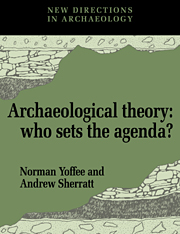Book contents
- Frontmatter
- Contents
- List of figures
- List of contributors
- Introduction: the sources of archaeological theory
- PART I THE SOCIAL CONTEXT OF ARCHAEOLOGICAL THEORY
- PART II ARCHAEOLOGICAL THEORY FROM THE PALAEOLITHIC TO THE STATE
- PART III CASE STUDIES IN ARCHAEOLOGICAL THEORY AND PRACTICE
- PART IV EPILOGUE
- 10 The relativity of theory
- 11 Archaeology: the loss of nerve
- Index
10 - The relativity of theory
Published online by Cambridge University Press: 03 May 2010
- Frontmatter
- Contents
- List of figures
- List of contributors
- Introduction: the sources of archaeological theory
- PART I THE SOCIAL CONTEXT OF ARCHAEOLOGICAL THEORY
- PART II ARCHAEOLOGICAL THEORY FROM THE PALAEOLITHIC TO THE STATE
- PART III CASE STUDIES IN ARCHAEOLOGICAL THEORY AND PRACTICE
- PART IV EPILOGUE
- 10 The relativity of theory
- 11 Archaeology: the loss of nerve
- Index
Summary
With prehistory we enter a world of few facts and much guesswork, a world moreover which is ruled by the archaeologists. This is worrying; while field-work has become an exact and exacting craft, archaeological discussion is often as much an indulgence as a discipline; where they might exchange hypotheses archaeologists are apt to demand adherence and to hurl polemics or even charges of corruption.
(McEvedy 1967: 9)The brilliant compiler of The Penguin Atlas of Ancient History quoted above, Colin McEvedy, set himself the task of constructing a set of maps illustrating the development of Europe and the Near and Middle East from prehistoric times. In so doing, he had to make use of the evidence of archaeology, and his continued characterization of the subject is worth pondering.
In prehistory… the archaeologist has been on his own; he has not only discovered the unlettered past, he has read it out, for all to hear; he has made pronouncements in a dozen fields, from metallurgy to sociology; he has had flights of fancy and fits of bad temper; he has been generally unlovely.
The great pioneers who led archaeology beyond the frontiers of recorded history invested very considerable personal fortunes in their chosen sites; striding confidently around their estates they would label an unexpected pot as an import and expect obedience. The habit of omnipotence spread to lesser men… amazingly it proved possible to give blow by blow accounts of prehistoric battles and, in more tender mood, tell how Woman shaped the First Pot.
Inevitably poetic license bred a puritan reaction within the profession, the puritans gained power and there was a ruthless clean–up. Not only was speculation condemned, but intellectual activity of any sort came to be frowned upon. […]
- Type
- Chapter
- Information
- Archaeological TheoryWho Sets the Agenda?, pp. 119 - 130Publisher: Cambridge University PressPrint publication year: 1993
- 8
- Cited by



